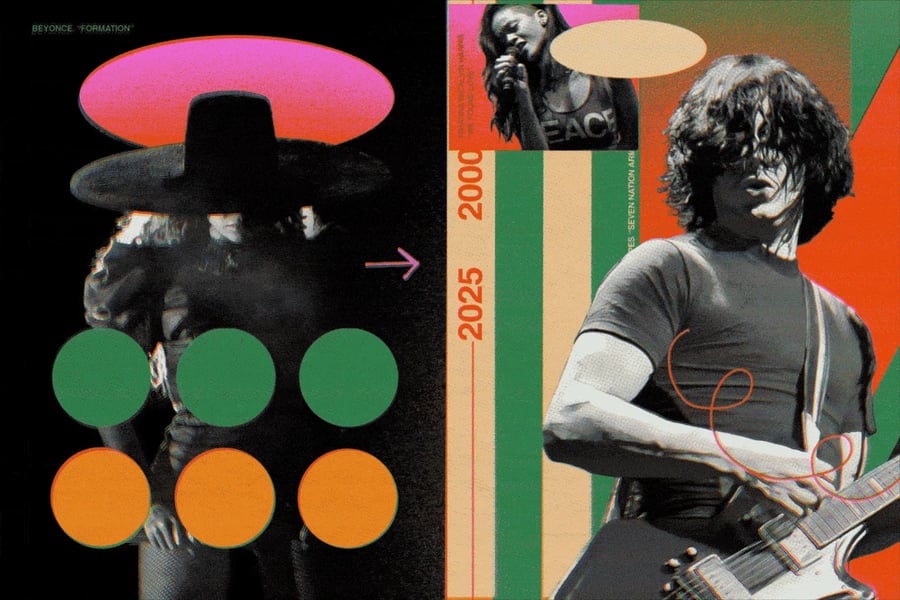The 250 Greatest Songs of the 21st Century So Far
25 years of classic hits from all over the musical map and every corner of the globe

MAX-O-MATIC
If there’s anything that defines music in the 21st century, it’s constant change. We live in an era when your next favorite song could come from anywhere — all over the stylistic map, all over the world. The whole experience of being a music fan keeps mutating all of the time. Back in Y2K, when ‘NSync dropped “Bye Bye Bye,” it was the peak for the era of buying CDs, until that era went bye-bye-bye. Napster happened; so did MySpace and the iPod. Streaming arrived; vinyl came back. New sounds keep getting invented, with the air full of eclectic and experimental songs. If you’re a music fan these days, you’ve got a whole planet of sound at your fingertips.
That’s the spirit behind our list of the 21st century’s 250 greatest songs so far. Like our list of the century’s greatest albums, it’s a wide-ranging mix of different styles, different beats, different voices. Some of these songs are universally beloved hits; others are influential cult classics. But this list sets out to capture the full chaotic glory of 21st-century music, one song at a time.
These tunes come from all over the map. In our Top Ten alone, we go from Stockholm to Compton, from Nashville’s Music Row to New York’s sleazy punk-rock bars. These songs range from Seoul to Spain to San Juan, from Vegas to Veracruz to Versailles, from Nigeria to Mexico to Colombia. There’s reggaeton and K-pop and drill and crunk, country and Afrobeats and emo and sirrieño. But the criterion for this list isn’t popularity or airplay — strictly musical brilliance and originality. Wherever these songs come from, they remind you that we’re living in a time of wide-open possibilities and nonstop innovation. Some of the most famous megastars of our moment — Beyoncé, Taylor Swift, Kendrick Lamar — are also the most adventurous.
Some of these songs come from legendary artists who managed to stay vital across the decades, like David Bowie, Mary J. Blige, Madonna, or Bob Dylan. Others come from teenage dirtbags. We have “Anthems for a 17-Year-Old Girl”; we also have “Drivers License,” an anthem from a 17-year-old girl. We have the ancient country grit of Johnny Cash, who signed off the year Olivia Rodrigo was born. We’ve got one-hit wonders, plus entire genres that came and went overnight. (Take a bow, Christian nu metal.) There’s tortured poetry and raw confessions. There’s also the one that goes, “Baby, you a song.”
We had plenty of arguments while putting this list together — and we enjoyed every minute. It’s a list of songs, not artists, so we mostly avoided repeating multiple tunes by the same performer. But some musical masterminds just had too many classics to deny. (If the universe wants to give Lorde both “Ribs” and “Green Light” in the same career, you can’t tell it not to.) Every fan would compile a different list — that’s the point. But this list sums up an era when there are no rules to follow, no playbooks to obey. Nobody made this list by playing it safe. Read on, turn up the music, explore — and get ur freak on.
You can listen to the whole list here, and to hear an in-depth interview with Missy Elliott about the making of our top pick, 2001’s “Get Ur Freak On,” go here for the podcast provider of your choice, listen on Apple Podcasts or Spotify, or just press play above.
Love Music?
Get your daily dose of everything happening in Australian/New Zealand music and globally.
CONTRIBUTORS: Waiss Aramesh, Jonathan Bernstein, Jon Blistein, David Browne, Mankaprr Conteh, Jon Dolan, Will Dukes, Brenna Ehrlich, Jon Freeman, Andre Gee, Maya Georgi, Sarah Grant, Andy Greene, Shirley Halperin, Will Hermes, Brian Hiatt, Christian Hoard, Joseph Hudak, Jeff Ihaza, J’na Jefferson, Maura Johnston, Jae-Ha Kim, Ernesto Lechner, John Lonsdale, Julyssa Lopez, Leah Lu, Angie Martoccio, Michaelangelo Matos, Tomás Mier, Jason Newman, Larisha Paul, Clayton Purdom, Mosi Reeves, Rob Sheffield, Brittany Spanos, Lisa Tozzi, Simon Vozick-Levinson, Alison Weinflash, Christopher R. Weingarten
From Rolling Stone US




















































































